The 2023 Ivey Talent Leaders Forum recently hosted by The Ivey Academy was a full day of interactive and collaborative learning with senior HR and talent leaders from leading Canadian organizations. Shown above, left to right, are David Loree, an assistant professor of Organizational Behaviour at Ivey; Janet Rodas, MBA ’16, Director of Human Resources at Aurora Cannabis Enterprise; Tiffany Smye, Senior Director of Talent Learning and Development at Maple Leaf Sports & Entertainment; and Lawrence Hughes, Executive Vice President and Chief People Officer at Porter Airlines Inc.
In an age where the only constant in business is change, lifelong learning has become vital for leaders. Where executive education once only marked specific career milestones, organizations now build their long-term competitive advantage around continuous learning and ongoing leadership development.
That’s led to a shift in both how and what executive education delivers. Gone are the days of one-size-fits-all programs. Personalized skill development, global perspectives, and action-oriented programs on critical business issues help leaders to keep abreast of trends and advancements and make an immediate impact on their organizations. And longer programs are now being complemented by short bursts of learning through webinars, half-day workshops, certificate options, and online modules to make learning more accessible and convenient.
Leadership development and executive education are shifting,” says Bryan Benjamin, Executive Director of The Ivey Academy, the School’s executive learning and development institute. “Taking a development course 20 years ago does not set you up for life. We need to rapidly innovate in order to meet ongoing executive development needs in an environment that is always changing.”
Here’s a look at how Ivey’s executive education has evolved over the decades and how the School is preparing to lead into the future.

Ivey’s Spencer Leadership Centre is the home of The Ivey Academy
The birth of executive education
When Ivey began offering executive education, it was a much different landscape. Business schools started offering short, non-degree courses in the 1940s to prepare Second World War veterans for general management and Ivey created Canada’s first offering, the Management Training Course, in 1948. At that time, such programs were expected to be short-lived.
Ivey’s history book, Learning to Lead, even reports people being puzzled that the Management Training Course was such a giant step forward. The Management Training Course went on to become Western University’s longest-running and most impactful executive program and lives on today as the in-demand Ivey Executive Program (IEP).
It turns out such programs addressed an enduring need in the business world – the need for leaders who have the skills and confidence to adapt to change.
Ivey’s executive education has come a long way since those early days. The first Management Training Course classes took place in primitive facilities, an old air force building the university had moved from Fingal, Ontario called Fingal Hall. Today, Ivey offers unique in-residence executive learning experiences at the Spencer Leadership Centre, a picturesque Georgian Manor surrounded by parkland in London, Ont., as well as programming in Toronto and Hong Kong.
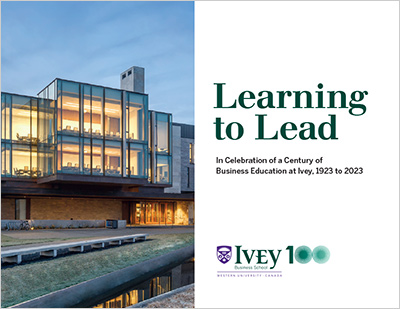
Learning to Lead cover
Back then, the Management Training Course was five weeks of “strenuous work,” to quote Walter A. Thompson, a former Ivey dean who founded the course. Today, there are a wide array of options – some that don’t even require executives to leave the office.
The Ivey Academy now provides both custom programs to address organizations’ specific needs as well as open enrolment programs on focused topics that are available to all individuals. Offerings range from half-day focused workshops to immersive, multi-module programs, and cover critical leadership topics such as neurodiversity, sustainability, and digital transformation.
Even core programs, like the longstanding Ivey Executive Program, have changed with the times, merging traditional elements such as strategy with critical issue-focused topics, such as sustainability, supply chains, and artificial intelligence. And the incorporation of blended online components make programs more accessible and convenient. It’s all part of creating next-level learning journeys to prepare leaders for the challenges of today and tomorrow.
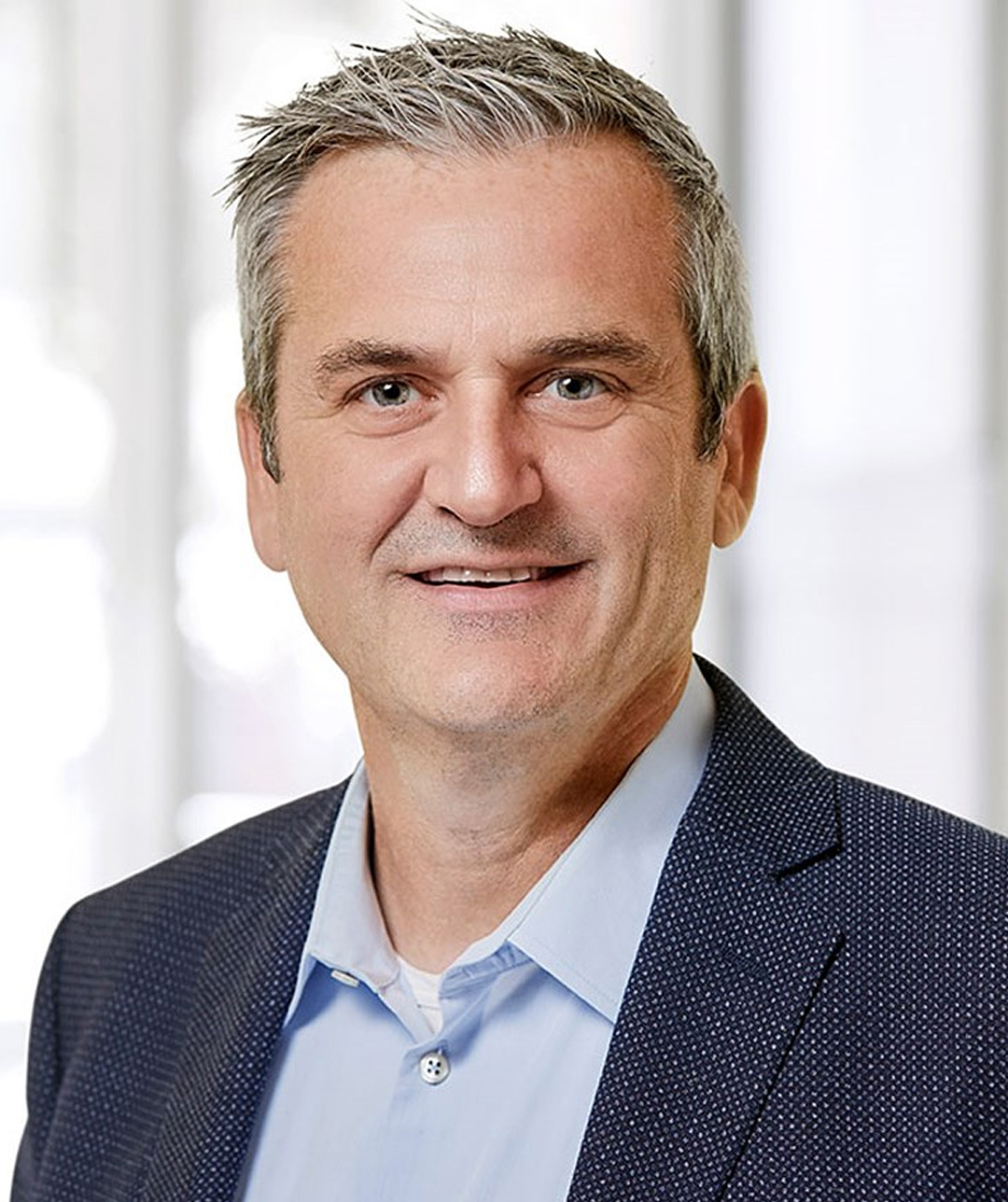
Bryan Benjamin, Executive Director, The Ivey Academy
“More than in any other time, substantive change in education is happening now. Schools need to step up and bring in modernized programming. We need to drive innovation. Ivey is positioned to be a leader in this space and disrupt an industry that hasn’t had a lot of disruption in quite some time.”
Disruptive innovation in executive education
This disruptive approach is embodied by the recent launch of three new Advanced Impact Certificates focused on the critical business issues around sustainability, inclusion, and digital transformation. The flexible learning pathway format allows participants to customize their programs by picking from a rotating selection of workshops. They also get a chance to work directly with an Ivey faculty member to address a specific organizational problem through an Action Learning Studio component.
“I see the Action Learning Studio as a real differentiator. With most pathway programs, you take a series of courses and get your certificate of completion, whereas we’re going one step further and making it about application,” said Benjamin. “We hope to be a bit of a trendsetter in the market with these and I imagine we’ll see more of this going forward.”
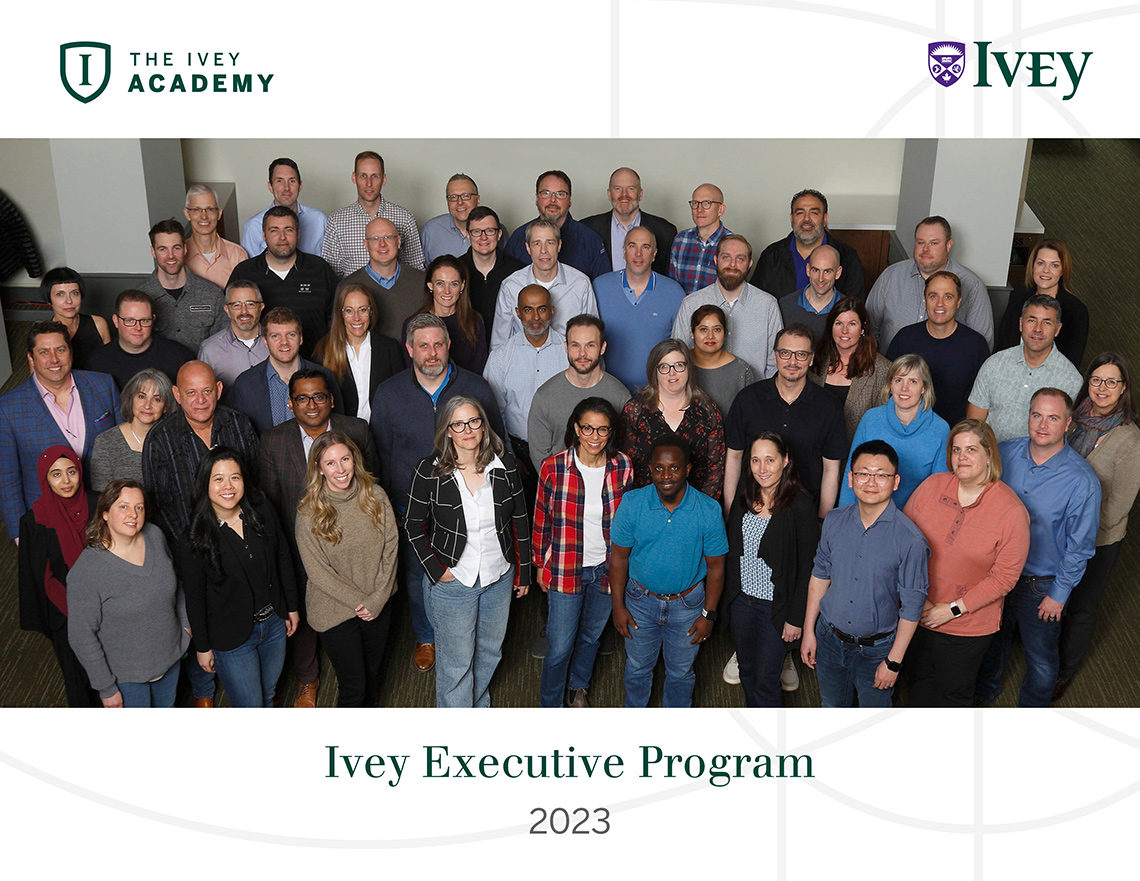
The 41 leaders who make up the Ivey Executive Program’s Class of 2023 were the largest cohort since 2001
Going digital
When the COVID-19 pandemic halted in-class learning, The Ivey Academy demonstrated one of its own leadership lessons in practice: It quickly shifted and took the business online, creating the Leadership in Practice livestream series. The series offered insights and advice from industry experts and Ivey faculty on the business issues surrounding COVID-19. To date, there have been 55 livestreams with more than 30,000 registrations and up to 500 participants per session.
Benjamin said the livestreams were so popular that they are still offered regularly on timely topics such as blockchain technology, sustainable finance, and the evolution of work. Although initially launched so The Ivey Academy could stay connected with clients and alumni, Benjamin said the livestreams’ success shows the appetite for short bursts of learning in flexible formats.
Even before the pandemic, Ivey had begun extending its reach and impact through online executive education. In 2021, the School became the first and only Canadian partner with ExecOnline, a subscription-based, online provider of executive education that works exclusively with top-tier business schools. The partnership has resulted in the creation of eight online modules led by Ivey Academy faculty on topics such as inclusive leadership, neurodiversity, and analytics – some even translated into multiple languages to reach a broader audience.
ExecOnline continues to be a valued partnership for us. It aligns with our strategy of having offerings delivered through multiple mediums to allow participants to learn in the way that matters most to them,” said Benjamin.
Preparing leaders for what lies ahead
And while innovations give rise to new approaches, traditional leadership development is in demand more than ever as companies navigate an uncertain post-pandemic environment. A case in point: The Ivey Academy recently celebrated its largest cohort of Ivey Executive Program (IEP) graduates in decades.
“One challenge that leaders have is learning to look at the horizon instead of what’s right in front of them,” says Martha Maznevski, PhD ’94, a professor of Organizational Behaviour and Faculty Director for Executive Education. Maznevski co-directs IEP along with Larry Plummer, an associate professor in Entrepreneurship.
We do a lot on understanding the environment and how to adapt a strategy or a way of leading,” she said. “So, getting your eyes up and thinking ahead – thinking about future opportunities and understanding trends that are in the marketplace, with the economy or society, and seeing how they might affect you in the future.”
One IEP component that helps participants to make an impact at their organizations is the LEAP (Learning Embedded in Action and Practice) Project where they work on an action plan for a specific challenge or opportunity. Another is the chance to learn how other leaders are coming at problems from different angles since the program brings together participants from government, non-profit organizations, and private industries in one classroom. Vanessa McKenzie, Senior Director of Strategic Policy with Indigenous Services Canada and a recent IEP participant, said she found it helpful to see the commonalities between organizational challenges.
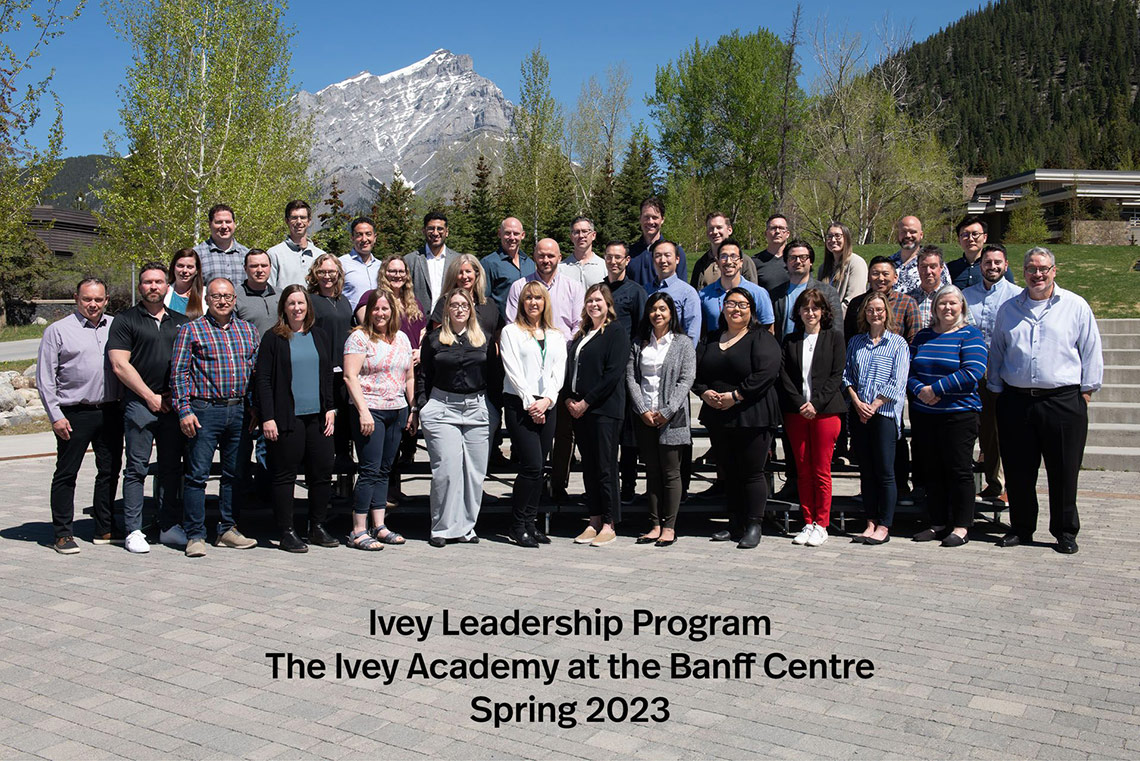
Ivey Leadership Program participants in Banff, Alberta
“It has been amazing to see, on the one hand, the complexity and the range of different challenges everybody is facing, but fundamentally, the similarities that we are facing in terms of what we do,” she said.
The Ivey Academy also develops customized leadership development programs for companies such as Bruce Power, Maple Leaf Foods, JD Irving, Manulife, and the Government of Canada. Cathy Sprague, Executive Vice President of Human Resources with Bruce Power, said Ivey has been a strategic partner in the development and delivery of Bruce Power’s Leadership Pipeline Program.
“By gaining an in-depth understanding of our leadership needs now, and in the future, the faculty designed an integrated solution that bridges the classroom and workplace action learning projects to accelerate the development of our high-potential leaders,” she said.
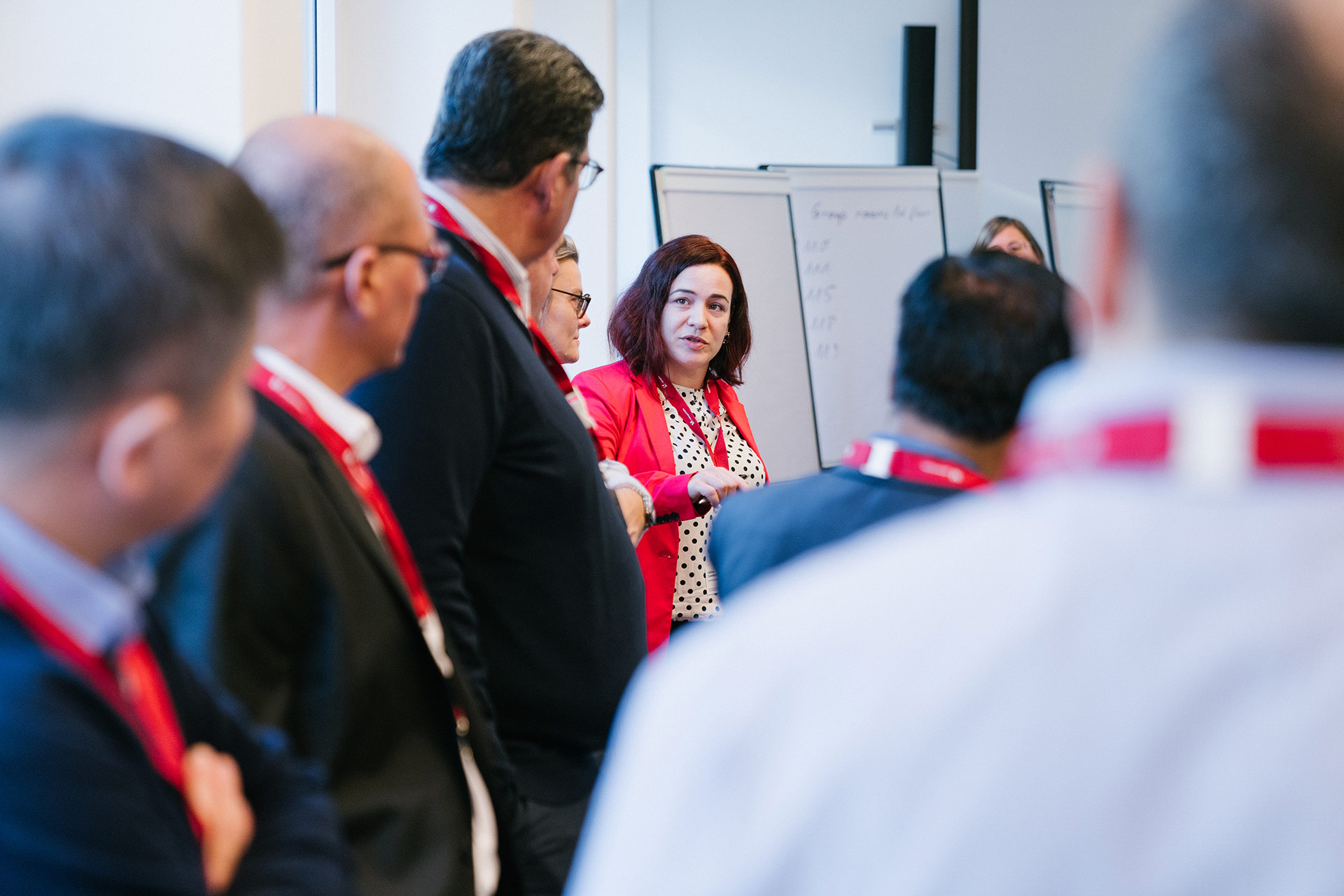
Participants from Holcim
Expanding into new geographies
While online programs provide flexibility and reach a broader audience, for some people, the in-person classroom experience is the only way to go. Benjamin said a big focus for The Ivey Academy going forward is to bring the signature Ivey case learning classroom experience to new markets. Programs and workshops have already been run in Banff and Calgary, Alberta and more are scheduled for later dates. Another priority is to work in closer partnership with Ivey Asia, Benjamin said, or even to partner with other like-minded universities in geographies outside of Canada.
And since the business world is already undeniably global, bringing an even greater international perspective to programs will be a big focus moving forward, says Benjamin. The Ivey Academy already works with international clients, including Holcim, IBM, RGA, and Sitonair, and more than 10 per cent of its open enrolment participants are international.
“A lot of our faculty and participants already have experience either living or working in other parts of the world, and that diversity makes for better conversations in class,” he said. “We want to bring a global perspective to all of the work we do, even if it’s with a Canadian organization with leaders based in Canada. The expectation today is that people are working in a global context so we need to be incredibly well-versed in that area.”
Toronto campus expansion
The Ivey Academy also plans to increase its impact in existing markets via Ivey’s new downtown Toronto campus. Thanks to a $30-million gift from Donald K. Johnson, O.C., MBA ’63, LLD ’07, Ivey’s overall footprint in Toronto will triple in size. Benjamin said the new campus will allow The Ivey Academy to offer more programs in Toronto and increase participation from Toronto-based organizations.
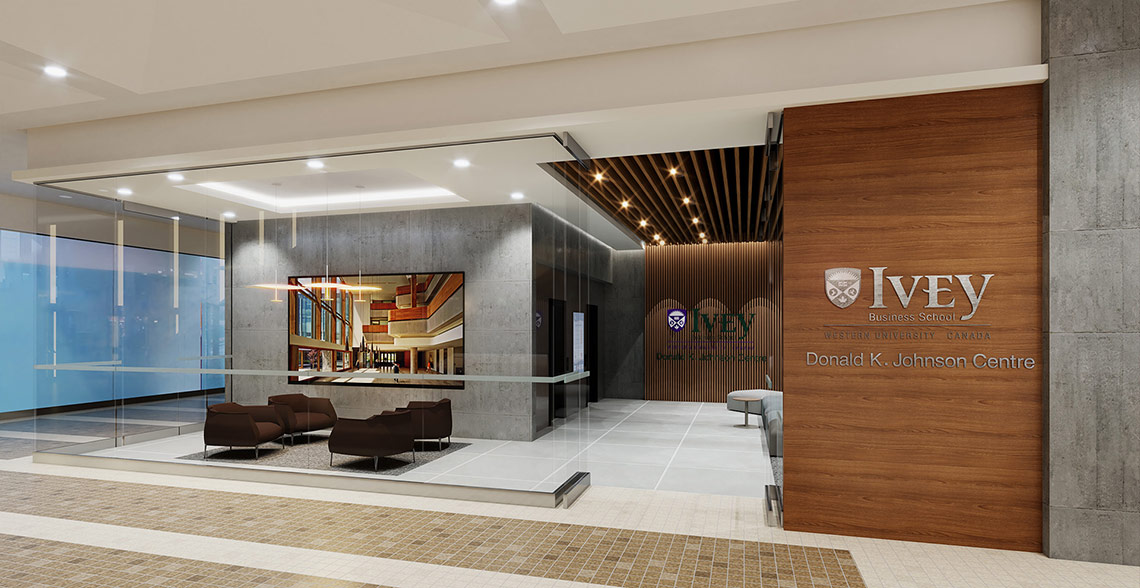
Ivey’s Toronto campus, the Donald K. Johnson Centre, will soon provide limitless opportunities for The Ivey Academy, and exceptional event space for alumni and student programming
Modernized programs with traditional Ivey components
As Ivey continues to evolve its teaching, research, and thought leadership around the critical issues, The Ivey Academy’s programming will evolve with it.
“We’re going to keep our fingers on the pulse because these will not be the only critical areas, but I think we’ve picked the ones that are going to be around for a while,” said Benjamin. “We’ll strategically add areas over time, but we want to stay focused. We want to hone in on the areas where we feel we can really be best in class.”
The one constant will be the case-based, real-world learning experience that has differentiated Ivey for a century and is still a key differentiator today.
“You get the whole Ivey experience. You work with Ivey faculty and you learn through business cases. You are going to have a highly applied and active experience, whether your program is in person, virtual, or blended,” said Benjamin.
Reimagining executive education is part of a series of stories to honour our School’s history and commemorate Ivey’s 100th anniversary.